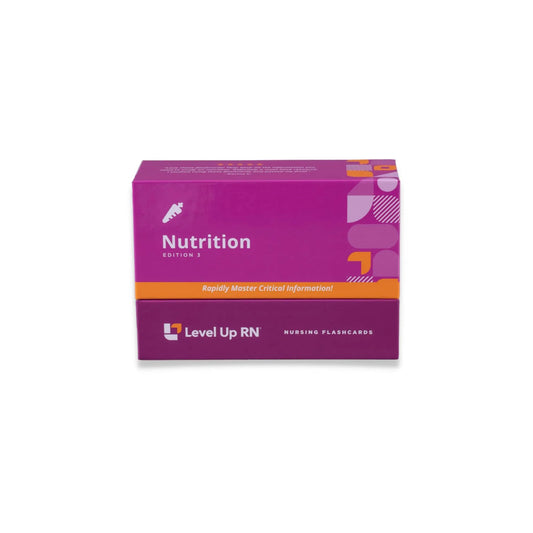Hi, I'm Cathy with Level Up RN. In this video, I'm going to continue my coverage of topics from our Level Up RN Nutrition Flashcard deck. Specifically, I'll be talking about foodborne illness. And at the end of the video, I'm going to give you guys a quiz to test your understanding of some of the key points I'll be covering, so definitely stay tuned for that. And if you have our flashcards, go ahead and pull out your flashcards on foodborne illness so you can follow along with me. And pay close attention to the bold red text on the back of the cards because those are the things that you are likely to get tested on in nursing school.
Foodborne illness is caused by contamination of food or beverages with bacteria, viruses, or parasites. Some common pathogens that can cause foodborne illness include norovirus, salmonella, campylobacter, E. coli, listeria, and toxoplasmosis. Key foods that are more likely to be contaminated and cause foodborne illness include raw or undercooked meat, poultry, or eggs, unpasteurized milk or juice, fruits or vegetables that are contaminated with animal feces, and raw sprouts. Foodborne illness can cause symptoms such as nausea, vomiting, diarrhea, fever, and dehydration. Treatment of foodborne illness includes the administration of an oral rehydration solution and possibly the administration of IV fluids and electrolytes. And then if a bacteria is the cause of the foodborne illness, then antibiotics may be prescribed as well.
In nursing school, you definitely have to know best practices for preventing foodborne illness. First of all, it's important that individuals wash their hands after using the restroom and prior to food preparation. Fruits and vegetables should be washed thoroughly prior to preparation and eating. And then separate equipment should be used to prepare raw meats as opposed to cooked foods. And then it's always important to use a meat thermometer to make sure meat is cooked thoroughly. Perishables need to be refrigerated within two hours of purchasing or cooking or within one hour if the outside temperature is above 90 degrees Fahrenheit. It's also important to make sure that the refrigerator temperature is kept at or below 40 degrees Fahrenheit, and the freezer temperature is kept at or below 0 degrees Fahrenheit.
All right, it's quiz time, and I've got three questions for you.
Question number 1. Unpasteurized milk or juice increases the risk for foodborne illness. True or false?
The answer is true.
Question number 2. Perishables should be refrigerated within blank hours of purchasing or cooking.
The answer is two hours or one hour if the outside temperature is above 90 degrees Fahrenheit.
Question number 3. The refrigerator temperature should be kept at or below blank degrees Fahrenheit.
The answer is 40.
All right. That's it for this video. I hope it was helpful. Thank you so much for watching, and take care.


